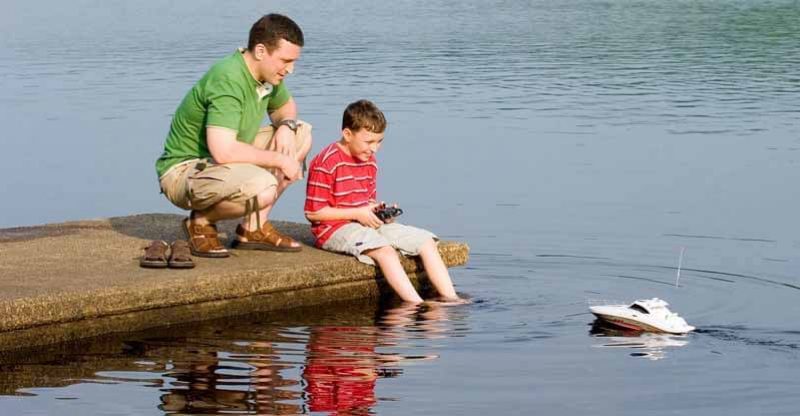3 Easy Methods – RC Boat Beginners Guide To Keep It Safe On Water
Introduction To Remote Controlled Boats
Did you enjoy playing in the water with toy boats as a kid? Do you still secretly wish that you could return to it as an adult? If so, a remote-controlled boat or RC boat is what you need.
You may have noticed the surge in interest for drones and flying quadcopters in recent years. Kids and adults both enjoy flying these crafts as a hobby. You can say that the RC boat is the aquatic or marine equivalent of a flying drone.
What is Boating?
You may have noticed some folks relaxing on the shore next to a local lake or pond, with RC transmitters in their hands. These guys are indulging in the fine sport and hobby of RC boating.
It involves controlling a remote-controlled boat in placid waters. Boating can be a competitive social activity, with fun races and contests among friends.
Boating For Beginners
RC boats are very beginner friendly. Unlike some other hobbies, you don't have to jump into the deep end of the pool here, both literally and figuratively.
RC boats are available in various classes based on size and complexity. So you can easily start with a smaller boat and gradually move up the food chain.
What is A Nice Beginner’s RC Boat?
A perfect beginner’s boat would be one that even a kid can use safely. It should have easy and intuitive controls. As a beginner, you shouldn't be heading out to deeper waters in your local lake or pond. Look for ones that can be used easily in a backyard pool.
Method 01

RC Boat Beginners Guide
RC Boats are easy to figure out, as there is a real difference between beginner, intermediate and advanced models.
In the following sections we will highlight the features, advantages and notable disadvantages of each class:
1. Beginner Level RC Boats
At this level, you will find boats that are toys. As small as 12 to 16 inches in size, these boats reach speeds of 5-7 mph.
Smaller mosquito boats and cyclone racers are very popular in this category. They are battery operated and can last for anywhere from 5 to 10 minutes on a single charge.
2. Intermediate Level RC Boats
You will experience a significant spike in performance and complexity at the intermediate range of RC boats. At over $200 prices, these are also very expensive.
They are also much larger than toy boats, often crossing 3 feet in length. Such boats are made from fiberglass or steel and can go as fast as 30 mph. The power options include battery and nitro gas.
3. Advanced Level RC Boats
The top of the line RC boats has 2-cycle gasoline engines. They are the most powerful and most expensive RC boats.
But since they use a fuel-gas mix, they are much cheaper to maintain than nitro powered boats. These engines allow for a lot of customization, and RC boat experts love to show off their creations.
4. RC Boat Kits
If you want to spend more time with an RC boat, you also have the option of buying RC boat kits. You can make a DIY boat construction project with these sets.
Fine wood crafted boats like tugboats and trawlers are popular in this line. You may have to buy a motor separately as not all kits come with built-in motors.
5. Summary
RC boat prices and complexity and directly linked. Beginners can safely invest in cheap toy boats. But since they have short runtimes, most adults will quickly outgrow them and upgrade to bigger boats.
These are faster have longer runtimes but will need larger bodies of water, like ponds or lakes. Massive gas-powered boats are for the seasoned experts and can cost a fortune.
Method 02
1. An Alternative RC Boat Beginners Guide
Beyond classification based on engine size and complexity, RC boats can also be categorized by other criteria. RC boats are incredibly diverse and cater to different types of boat enthusiasts.
There are RC boats for folks who love sailing, and others for those who love racing. On the other hand, if you like accurate models of famous ships, you can find these as well in the RC boat market.
2. RC Boat Basics
From this perspective, there are three types of RC Boats:
- Sail RC Boats: these boats are strictly for sailing enthusiasts. They use wind power and offer a very relaxing boating experience.
- Racing Boats: powered by either electric/nitro/gas, these are the real speedsters in the RC boat world. If you like them fast, this is the category for you!
- RC Scale Boats: If you are a ship-buff who likes famous destroyers, ocean liners, or battleships, these are the boats for you. They focus on realism and details over speed.
3. How To Prep RC Boats
You need to follow these basic steps before starting the engines on your RC boat:
- Always read the user manual and learn all the controls and features
- Charge the RC batteries properly before every boating session.
- Lubricate the prop or flex shaft with marine grease to increase the longevity of your boat.
- If you are using Li-Po batteries, you will also have to configure the electronic speed control on board these modern RC boats.
- Seal the canopy and keep everything inside the boat dry.
- Do a range check for your boats RC transmitter and controller.
4. RC Boat Safety Tips
- Read the user manual from time to time to remember all the important aspects of the boat.
- Use fresh batteries whenever possible, and replace/recharge the batteries properly.
- Always make sure that the frequency of your RC is clear from any radio interference.
- Use a failsafe device on board to cut the throttle if the boat goes out of range.
- Do frequent inspections and checks on the boat for any signs of wear or damage.
- Follow safe and prescribed fuel refilling procedures.
- Lookout for people, animals, and other nearby obstacles when operating RC boats.
5. RC Boat Systems
Regardless of the cost and complexity, all RC boats have the following components in the system. First, there is the remote controller, also called the radio transmitter. These can be pistol grip or twin stick design. A radio receiver built into the boat captures the signals from the transmitter.
The final component of the system is a battery pack, usually a NiMH or LiPo variants. Even gas or nitro-powered boats need battery packs for the radio system. Some models use AA batteries.
6. Get In Touch!
As you can see, RC boats can be pretty complex, especially at the higher end of the market. If you need further information, or have any queries, feel free to reach out to us. We are always available to help you learn more about these wonderful boats.
Method 03

Things You Should Know About RC Boats As A Beginner
When looking to buy your first RC boat, look at the following factors before making a decision.
1. Figure Out Your Choice Type Of RC Boat
RC boats cater to different types of boating enthusiasts. Figure out which group you belong to, and your task will be much easier. The different types are:
- Sailing Enthusiasts: if you like boats that use wind power to glide across the water, you can look at sailboats. The RC is used to control the rudder and sails in these boats.
- Ship enthusiasts: If you like a particular model or class of ship/warship, you can buy their scale models. They look and run like the real thing.
- Speed fiends: faster racing sailboats and powerboats are what you want to look at if you have the need for speed.
2. Check the Hulls
The hull shape determines how well a boat operates in the water. There are three main types:
- Monohulls: These are V-shaped and look like regular boats. They are stable even in rough weather.
- Hydroplanes: they look like dull, pronged forks, and are not suited for rough weather. They are used for oval racing.
- Catamarans: they have twin sponsons on both sides of the hull. They are slower but more stable than monohulls.
3. Beware Of Salt Water
Corrosion is the main threat to the longevity of RC boats. And salt water is twice as corrosive as fresh water. So if you do take your boat into salty waters, remember to clean them thoroughly afterward.
4. Seal Everything
Check the boat for any holes, tears, or loose screws before putting it in the water. The inner parts are more vulnerable to corrosion. And since the electrical components are inside, water leaks can permanently damage these parts and render the boat inoperable.
5. Care for the Battery
Avoid overcharging the battery. Keep it stored in a cool and dry place away from sunlight or heat. Without a good battery, the RC boat cannot function.
6. Always check the Frequency
If there are multiple RC boats in an area, there is always the risk of having both boats running on the same frequency.
This can cause confusion as both boats will respond to commands from two controllers. Always check with your nearby RC boat enthusiasts regarding the frequency they are using to avoid this confusion.
7. Don't Forget Range Checks
These are very important for new boats. They ensure that you are in complete control of the boat. First, do the check on dry land to figure out the maximum range of the boat. Then take the boat to the water for other tests.
The best way to learn more about RC boats is actually to use one in the water. But before you do that, learn as much as you can from online sources, videos and user manuals. Always familiarize yourself with your boat for best results.





